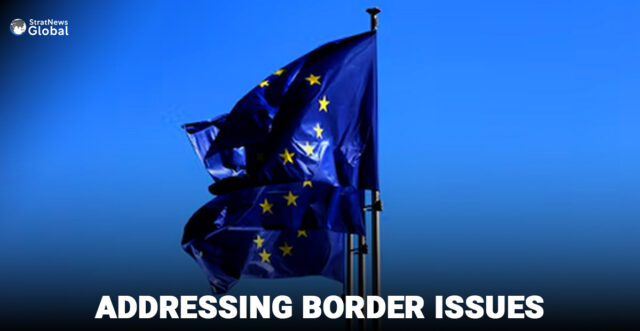Bosnia and Herzegovina on Wednesday signed an agreement with the European Union to receive technical assistance and deploy EU border guards, aiming to curb illegal migration and cross-border crime.
The agreement was signed in Brussels by Borjana Kristo, the chairwoman of Bosnia’s Council of Ministers, and Magnus Brunner, the EU Commissioner for Internal Affairs and Migration, a statement from Kristo’s office said.
“The signing today … is an important step forward on the European path of Bosnia-Herzegovina, which has thus fulfilled an EU condition and become a credible partner in securing the external borders of the EU,” the statement said.
An EU candidate country which has yet to start negotiations on the membership of the 27-member bloc, Bosnia was the only Western Balkan country besides Kosovo that had not signed an arrangement with the EU’s border agency, Frontex.
Thousands of people from the Middle East, Afghanistan, Pakistan and North Africa use the so-called Balkan route, which runs via Turkey, Bulgaria, North Macedonia and Serbia, to reach wealthy Western countries.
Frontex can assist EU countries by exercising powers such as border checks and registrations.
The EU has said its increased cooperation on border management with the Western Balkan countries has significantly decreased illegal border crossing, with a downward trend continuing in 2025.
Bosnia borders EU member Croatia, as well as Serbia and Montenegro, the countries which, along with Albania and North Macedonia, have signed arrangements with Frontex.
Border Issues
Bosnia and Herzegovina, situated at a strategic crossroads between the Balkans and the European Union, continues to face significant border challenges, particularly concerning illegal migration and cross-border crime.
As a key transit country on the so-called Western Balkans migration route, Bosnia has seen a steady flow of migrants attempting to reach Western Europe. Many enter the country through its southeastern borders and gather in border towns near Croatia, awaiting opportunities to cross into the EU.
This situation has put immense pressure on Bosnia’s border management and internal security infrastructure.
Limited resources, porous borders, and complex terrain make it difficult for local authorities to effectively monitor and control illegal crossings.
In parallel, organised crime groups have exploited these weaknesses to facilitate human trafficking, smuggling of weapons, and drug transit through Bosnia’s territory.
To address these concerns, Bosnia and Herzegovina has been working closely with international partners, including the European Union.
(With inputs from Reuters)





